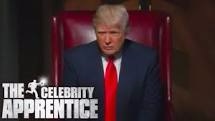After the various financial escapades that Trump had more or less success in had run their course, he was enticed to switch direction. Instead of airlines, steaks or vodka reality TV mogul -and undisputed creator of the genre- Mark Burnett approached Trump about doing a series.
Trump was resistant at first.
Reality TV was 'for the bottom feeders' of the industry, and right he was. But Burnett was a visionary. He knew they not only worked because of their lack of predictability but they were notoriously cheap to produce.
A TV series could cost NBC $3-7 million per episode. But these cost but a fraction of that. So, Trump, now sold on the fact his name, which is his brand, could be elevated.
The show was an instant success. The format, which was simple, was a small group of candidates would be put through an entrepreneurial trial by fire and the winner would get a one year contract to work for Trump at a $250,000 salary.
Trump estimates he has made $214 million from the show alone. It has run for 14 seasons, and it's continued success has elevated the Trump brand to superstar status, where it currently resides.
The show is studied on college campuses as a template for how to create a business plan, and execute it in a challenging environment. Today, with Arnold Schwarzenegger replacing Trump it is struggling to find it's feet but still is a net profit for the network.
Much of Trump's television persona as President is derived from the show; down to his stern expression and famous blue jacket and red tie. He understands media like no other man in that office save for Ronald Reagan.
This, and controlling the narrative, are major reasons behind his success and also why the media is always a step (or two) behind him. It also explains why he was, and still is, underestimated.
The news media feels itself not only superior to the entertainment section, but the 'reality TV' segment is particularly reviled; it's snarkily referred to as the 'Duck Dynasty' or 'Honey Boo Boo' (two particularly egregious examples) segments.
And that an interloper like Trump, a 'carnival barker' as the previous White House tenant called him, could come in THEIR world and not only dominate it, but render them objects of ridicule is a massive pain; an existential threat to their inflated senses of self regard.
As for Trump, the most correct analysis of his rise to power and Presidency is to consider THIS mix:
He's an aggragate of Teddy Roosevelt, George S Patton, PT Barnum with a touch of Andrew Jackson. He has the agenda of Roosevelt; a populist, with the command presence of Patton and the, well, 'blarney' of Barnum.
Any military type will tell you that 'showmanship is leadership' and the best generals have a lot of style, be they Ceasar, Napoleon, MacArthur or even Schwartzkopf.
Trump may, or may not, belong in that league. That's for future history. But his accomplishment- blowing past 16 other GOP candidates, relegating every major figure in the world from the Pope to Satan himself irrelevant and picking the pocket of the Democrats and their anointed candidate is a pretty convincing argument.
They weren't the toughest opponents, true. Lockstep, collectivist thought does that to a global movement.
Many said when he first entered the fray, how could a political neophyte and reality TV star enter this arena and succeed against all these seasoned operatives was the everyday meme.
Not here. The exact opposite was postulated; how could any of these two bit politicians who have never done a hard day's work in their lives compete against a New York billionaire?
It was always just a matter if he was serious or not. Turned out he was.
All he did was beat all of them. And for about 20 cents on the dollar too...
NEXT
Why he decided to run.

Latest comments
if it's ever going to be it is NOW.
Right you are, it’s go time!
thanks for the kind words...
Love your work. Talked with you on Twitter until I was banned from the platform. Thanks for still being here.